The results are in: Stack Overflow’s 2021 Developer Survey is now officially out, and it contains some interesting insights into the most popular software development technologies and the overall state of the industry at the moment.
So, without further ado, let’s take a look at what Stack Overflow found. We’ll also throw in some stats from a couple of other surveys for good measure (and to see how the numbers stack up).
Happy reading!
First Things First: Meet the Survey Participants
In May 2021, Stack Overflow interviewed over 80,000 software developers — mainly full-stack, back-end, front-end, and desktop engineers — worldwide. That said, most of the respondents were based in the U.S. or worked for American companies. The top 10 countries were:
- U.S. (18.33%)
- India (12.61%)
- Germany (6.75%)
- U.K. (5.37%)
- Canada (3.61%)
- France (3.25%)
- Brazil (2.7%)
- Poland (2.16%)
- Netherlands (2.13%)
- Italy (2%)
The study participants included people at different positions and with varying levels of coding experience and familiarity with software development technology — from business leaders and C-suite executives to non-business users and fledgling developers under the age of 18.
Half of the respondents said they had been coding for 10 years or less. Unsurprisingly, managers and senior executives had the most years of professional coding experience. Those working in machine learning and data science were at the other end of the spectrum, with less experience even than academic researchers.
What Are This Year’s Hottest Software Development Technologies?
Scroll down to read some of the things the survey participants had to say about their favorite (and least favorite) technologies and the overall software development landscape.
However, keep in mind that this is just a small selection of Stack Overflow’s findings, so be sure to check out the full survey to get the whole picture. And if you’re more of a visual learner, you may want to have a look at this video summary of the report.
Most Popular
Programming Languages
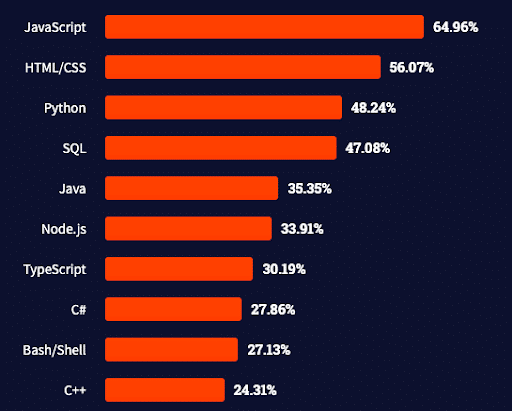
Cloud Platforms
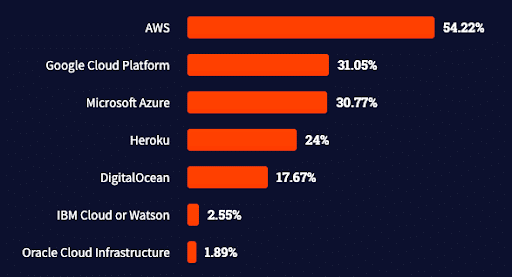
Other Tools
Let’s fast forward to the Other Tools category, where more than 90% of the survey participants reported they use Git. This indicates that it may be a must-have for most developers out there. For comparison, only 48.85% of the respondents said they use Docker, the second most popular tool.
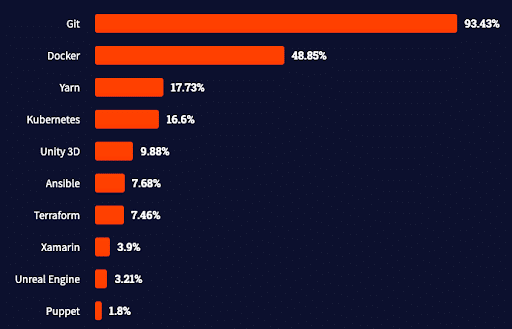
Most Loved, Dreaded, and Wanted
Programming Languages
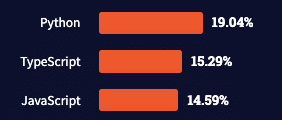
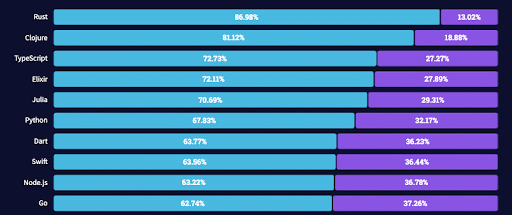
Worked vs. Want to Work With
Programming Languages
For this category, Stack Overflow asked the respondents:
- Which programming, scripting, and/or markup language(s) they have worked with extensively in the past year
- Which language they would like to work with over the next year
Some notable software trends here include:
- More than 10,000 JavaScript developers said they wanted to start or continue working in Rust or Go, and over 20,000 wanted to give Node.js a try.
- A sizable demographic of 23,712 JavaScript developers wanted to learn TypeScript, much like 70% of the respondents in this 2020 State of J.S. survey.
- Most of the developers who want to work in Dart currently use JavaScript.
- Virtually the only people that expressed interest in PHP were SQL developers.
- C# seems to be gaining popularity: 12,630 JavaScript and 11,518 HTML/CSS developers said they want to work in C# over the next year.
Learning and Problem Solving
What Do Developers Do When They Get Stuck?
Unsurprisingly, the vast majority of respondents look for solutions to their problems using Google or on Stack Overflow’s website. 9.37% meditate, and a worrying 11.99% go into panic mode.
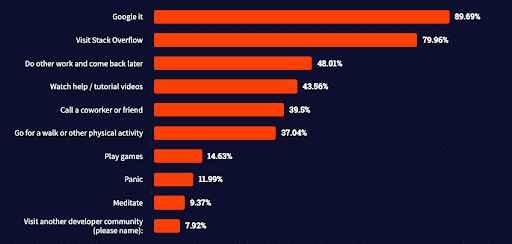
How to Keep Up with Technology Trends: Some Best Practices
Software innovation never stops. To make sure you’re always on top of the latest technology in software development, consider the following modernization and software application development best practices. When done right (and before you complete your product or digital transformation, not after), they can be a great asset to businesses.
Replace Your Legacy Software
Dated applications are more vulnerable to cyberattacks, reduce your efficiency, and become progressively harder to maintain and integrate over time — and these are just some of their many hidden costs. Legacy software also prevents you from adopting and making full use of more advanced software technologies.
With this in mind, it may be a good idea to periodically analyze what tech stack would work best for your needs. If it turns out that some of your tools and business processes need changing, consider replacing them with modern software applications. Not only are they faster, more flexible, and more cost-effective, but they are also more compatible with modern third-party software and may help improve the user and customer experience.
Invest in Ongoing Training
It’s important to give your staff access to high-quality continuing education on trending software development technologies and modern apps. You may also consider providing your team with incentives to take full advantage of the training opportunities. This way, they will always be up to speed on the latest software development trends.
Create Technology Roadmaps
A technology roadmap is a planning tool that comes in handy when developing or introducing new technological solutions. You can use I.T. roadmaps to clearly define your goals and business strategy, set action steps and deadlines, assess potential risks, allocate resources, and more. Roadmaps can also be used to break down and explain new tools to a non-developer audience. This can help ensure the smooth implementation of new software development technologies across your organization.
Get a Remote Software Engineer Team
Here’s the thing about new technologies: they come with a learning curve and may require highly specialized application development skills. And sometimes, your in-house staff may not have the expertise to work with the latest tools.
If that’s your case, consider software development outsourcing or IT staff augmentation services. A remote team can help fill skill gaps in your organization and provide you with the expertise you need quicker, easier, and at a lower cost than hiring engineers directly.
Consider Outsourcing Innovation
Software development technology changes daily. But what if you don’t have the in-house capacity to research and keep up with industry trends in real time?
In that case, it may be a good idea to look into innovation outsourcing and delegate some or all of your technology research, idea generation, and strategy development to an external service provider. Studies show this can help shorten product cycle times, reduce innovation costs by 60-90%, and result in ROIs of up to hundreds of times the original investment.
Modern Software Development and Innovation Management with Zartis
Don’t want to get left behind the technology curve? We can help!
Technology Consulting
You can use our technology consulting services to design and implement technology roadmaps or outsource your innovation process. Our experts can also help you build new tools, modernize legacy systems, improve your development process, carry out large-scale migrations, and more.
Dedicated Development Teams
Our team augmentation services may be just the thing you need to close the skill gaps in your in-house staff, enable your business growth, and get ahead of the technology curve (and your competitors). Our engineers work with the latest software development technologies and can help you build cutting-edge products quickly and cost-effectively.
Ready to get ahead of the current trends in software development? Start the conversation to explore our business solutions.

